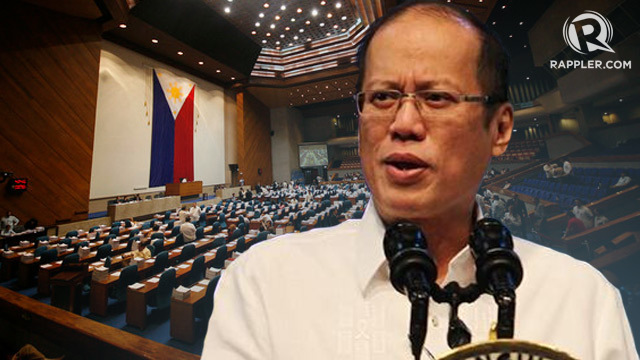
PRESIDENTIAL VETO. President Benigno Aquino III has vetoed nearly 80 bills in his 6 years in Malacañang, the highest post-Martial Law (Photo from Rappler)
MANILA, Philippines (2nd UPDATE) – In President Benigno Aquino III’s 6 years in Malacañang, he vetoed 81 bills passed by both the Senate and House of Representatives.
Among all the presidents after Martial Law, it was Aquino who rejected the most number of bills, followed by former President Fidel V. Ramos with 51 measures.
It was during the 15th Congress (2010-2013) that the President vetoed most measures, a far cry from his 3 vetoed bills during the 16th Congress (2013-2016). Among them were the P2,000 monthly increase for SSS pensioners and the pay hike for entry-level nurses.
While most of the vetoed measures were local bills seeking to change names of roads and to convert local to national roads, others were also crucial and controversial that his decision to reject them sparked public uproar. Among them were the Magna Carta for the Poor, the Rights of Internally Displaced Persons Act, and the SSS pension hike.
Palace Communications Secretary Herminio Coloma Jr acknowledged that it was indeed Aquino who rejected the highest number of bills among all presidents.
In defense, he said, most of the vetoed measures were local bills and that there was no need for most of them.
“President Aquino vetoed a total of 80 bills, of which 60 were local bills including 58 bills on road conversions from local roads to national roads that would have ended up unfunded because these were deemed technically deficient and should not have been converted in the first place,” Coloma told Rappler in a text message.
Unfunded laws are those that have been signed into law but do not have the necessary funding. These measures ultimately end up being placed at the backburner, as they can only be implemented once government finds additional fund sources.
Liaison problem
Most lawmakers blamed the Presidential Legislative Liaison Office (PLLO), specifically PLLO Secretary Manuel Mamba, for the huge number of presidential vetoes. Some senators even sought the removal of Mamba but to no avail. (READ: PLLO chief enjoys Aquino's trust – Valte)
After all, they said, Mamba failed to fulfill his crucial function of coordinating between the two houses of Congress and the Office of the President.
Mamba and then Senate President Juan Ponce Enrile have been bitter rivals in local politics in Cagayan province for decades.
The former admitted he rarely went to the Senate because Enrile didn’t want to see him there. Mamba earlier told Rappler that since he became PLLO chief, coordination with the Senate was done through Undersecretary Antonio Gallardo "because the Senate President refused to deal with me because of our political differences in Cagayan."
Mamba, however, also argued that it was the lawmakers’ fault if their pet bills were rejected by Aquino. Some bills, he added, contained inconsistencies with the administration’s priority legislative agenda. The President, he maintained, does not like signing bills into law without studying itor without asking inputs from concerned agencies.
Here are the significant, and sometimes controversial, measures rejected by the President:
A Fixed Term for the Chief of Staff of the Armed Forces of the Philippines
This was the first measure vetoed by Aquino.
The bill sought to establish a 3-year fixed term of office for the CSAFPs “to give due recognition to the significance of the position of the chief of staff of the AFP in order to promote the stability of the AFP as an institution thereby enabling it to perform its constitutional mandate."
Presidents, in practice, appoint AFP chiefs of staff for a term of at least one year. (READ: Fixed term for AFP chief staff: Why it's needed)
Source and Original Article from: >>> Rappler

Comments